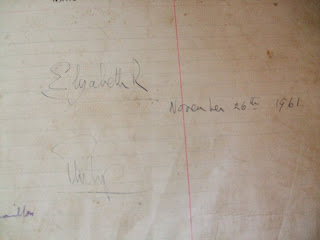We did our best to let the team see something of central Freetown on our last full day.
If you know the area, you may have suggestions of other places to visit, but for us the first stop was the Museum, officially closed as it was Saturday, but a kind curator agreed to let us in! It contains many items associated with local culture and the history of Freetown.
A picture of Freetown in 1792 with the Cotton Tree in the centre. The Cotton Tree is an historic symbol of the city. On March 11, 1792, Nova Scotian settlers landed on the shoreline and walked up to a giant tree just above the bay and held a thanksgiving service there, gathering around the tree in a large group and praying and singing hymns to thank God for their deliverance to a free land. The land was dedicated and christened 'Free Town' according to the instructions of the Sierra Leone Company Directors.
Many believe that the present Cotton Tree is the site where this happened.
The Cotton Tree today.

Alpha Kargbo next to a model of Bai Bureh, a man many believe to have been the greatest leader in the history of Sierra Leone. He was the chief of the Loko tribe to which Alpha belongs. Bai Bureh (February 15, 1840 – August 24, 1908) was a ruler and military strategist who led the Temne uprising against British rule in 1898 in the Northern part of the country. A gifted man with many admirable qualities, he deserves a separate mention in the blog. We shall leave the museum here and move up the hill to the British Council.
Approaching the British Council building. Was it open? Well at least the bit producing light refreshments was, which is what we wanted.
Very British! Enjoying a cup of tea. The British Council's remit is "to build mutually beneficial cultural and educational relationships between the United Kingdom and other countries, and increase appreciation of the United Kingdom’s creative ideas and achievements."
Then on to the Big Market in Wallace Johnson Street. A large building which is home to numerous sellers of local arts and crafts. Unfortunately the ratio of sellers to tourists is not in the traders favour, after all I understand that last year the country attracted only 5000 tourists. Therefore a buyer is the subject of many people's attention and it can be rather unpleasant. In spite of this many of us were able to buy some attractive objects. Anne Marie was very satisfied with her dress.
Check out this clip for a tour of the market and a view of many of the items on sale.
Across the road from the market is the coolness and calm of St. George's Cathedral, completed in 1828 for the Church Mission Society Anglican.
It was the main centre of the religious life of the colony and the memorials show the difficult conditions that were encountered before the discovery of quinine in the fight against malaria. Here are two of them.
Sacred to the memory of Robert Corley, RAC Corps, who survived the Battle of Waterloo and perished in this unhealthy climate, June 16th 1837, in the 39th year of his age.
This memorial was erected at the desire of the afflicted parents of John Mansfield, mate aboard HMS The Scout, in token of their untimely and irreparable loss from the effects of a season sickly beyond example, in a climate pre-eminently fatal to the health and life of Europeans. May 6th 1833.
The Queen attended a Thanksgiving Service in the Cathedral to mark the Independence of Sierra Leone in 1961, and left her signature in the visitors' book.
Then to the beach. We have been there before in past posts - but it is always worth it.
Lumley Beach
The end of a perfect day, and for Sam and Susie, the week was to be the start of a new and growing relationship! Congratulations and Best Wishes for the future. The photo I liked best of you is

















